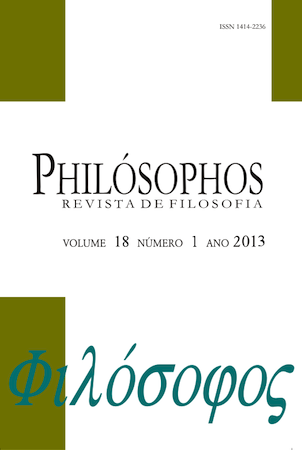WHAT IS A POLITICAL IN THE THEORIE OF COMMUNICATIVE ACTION? ABOUT THE DEFICIT OF INSTITUTIONALIZATION IN JÜRGEN HABERMAS?
DOI:
https://doi.org/10.5216/phi.v18i1.18947Keywords:
Jürgen Habermas, public sphere, politics, communicative action.Abstract
This paper aims to elucidate the negative understanding of politics (depoliticization) that results from the classic work of Jürgen Habermas about communicative action. The political potential of communicative action that results from political public sphere and the institutionalization of practical and political discourse constitute the leitmotiv of Habermas’s political philosophy. However, the understanding of politics that results from the communicative action presents the problem of limited capacity of realization of a discursive social practice in institutional contexts. The social-integrative power (social integration) of communicative action and the communicative power (power of influence) do not refer directly to the democratic procedures into political-institutional level. The political public sphere, as it defends the lifeworld in relation to systemic imperatives of power and money, it is not directly linked to institutional complexes and, therefore, it can only “besiege them”. This deficit of institutionalization undermines the political public sphere model (the potential political discourse in a communicative public sphere) that results from the theoretical framework of Theorie. Consequently, the “defensive” vision of politics undermines Habermas’ emancipatory project, because it does not expand the areas submitted to social and communicative rationality and does not open communicative channels for inflows in the political-administrative system. From the perspective of the theory addressed to emancipation (as is Habermas’ theory) these defensive movements, although they are important, are not sufficient, because defending it only does not expand the social areas in which the communicative understanding predominates. This is the reason for critical discourses and posterior need of reformulations.Downloads
Downloads
Published
How to Cite
Issue
Section
License
Authors who publish in this journal agree to the following terms:
- Authors retain copyright and grant the journal right of first publication, with the work simultaneously licensed under a Creative Commons Attribution License that allows others to share the work with an acknowledgement of the work's authorship and initial publication in this journal.
- Authors are authorized to enter into separate, additional contractual arrangements for the non-exclusive distribution of the journal's published version of the work (e.g., publishing in an institutional repository or as a book chapter), with an acknowledgement of its authorship and initial publication in this journal.















